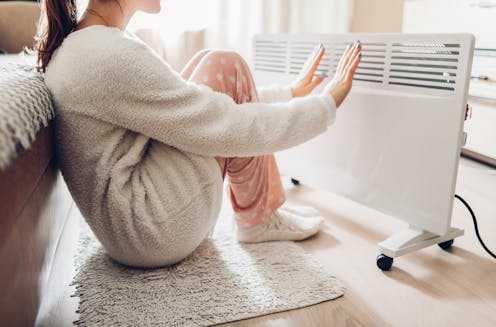Why are my hands and feet always cold? And when should I be worried?
- Written by Christian Moro, Associate Professor of Science & Medicine, Bond University

Do you, or someone you know, often complain of having constantly cold hands and feet? In most cases, this is not a problem, and simply due to the body maintaining its temperature.
For our bodies, blood is a fantastic store of heat. By diverting blood to the skin, heat is transferred to the outside air, helping to cool us down. This is why we might look a bit “flushed” on a hot day.
On the other hand, when we are feeling cold, the blood vessels in our skin narrow so less blood is diverted there. Less blood means less warmth, and this becomes particularly noticeable in the hands and feet.
It’s a normal process, and shows that our body is doing its job of maintaining a normal internal temperature and protecting our organs.
Normally, the feeling is only temporary. But if someone always has cold hands and feet, even when their body is quite warm, it could be a sign that something else is contributing.
Read more: Why do my armpits smell? And would using glycolic acid on them really work?
Could there be other causes?
Anything that induces a narrowing of blood vessels can impact how warm your extremities feel.
This could be from causes such as Raynaud’s phenomenon, in which some blood vessels going to the extremities temporarily narrow.
People with Raynaud’s typically present with very pale and cold fingers or toes.
In some cases, it is not clear why people exhibit symptoms of Raynaud’s. In other instances, it may be a result of more serious underlying causes, such as an immune deficiency or associated with high blood pressure.
But other factors could also be behind unusually cold hands. Anything that blocks blood getting through the vessels can result in colder extremities.
For example, people with uncontrolled diabetes have a higher chance of fatty deposits forming inside blood vessels, making them narrow and hard, and inhibiting blood flow.
Trauma or tissue damage could also result in inhibited blood flow to the area. If someone has undergone hand or arm surgery, or had a past injury, it may impact how warm their extremities feel.
Another possible cause is anaemia, which can impair the transport of oxygen-rich blood around the body and result in cold hands and feet.
Smoking can also be behind a case of icy fingers and toes; nicotine causes the blood vessels to narrow and reduces blood flow.
Read more: Curious Kids: why do our toes and fingers get wrinkly in the bath?
When is it a concern?
Under normal circumstances, cold hands and feet are not a worry.
But just keep in mind that it’s due to a reduced blood supply reaching the extremities. Over time, this can result in brittle nails, dry or cracked skin, discoloured skin, and a feeling of tingling or numbness in the areas.
These regions may also be less sensitive when cold; and it can even become quite painful to use your fingers or feet when they are ice cold.
A reduced blood supply might make the hands and feet slower to heal if injured, potentially allowing infections to persist and grow.
Over time, inhibited blood flow can also damage the nerves as well. The impact on the nerves, alongside increased risks of infection, can sometimes result in the requirement for amputations.
So if consistently cold hands and feet are a worry, it’s always worth mentioning this to your family doctor.
Read more: What causes dry lips, and how can you treat them? Does lip balm actually help?
What should I do about my cold hands and feet?
If you do start to feel a temporary chill in your extremities, stick to the basics. You can:
pop on a pair of thick socks; this is also beneficial for sleep, as research shows warming up the feet can help with sleep quality
wear gloves or mittens
wash your hands in warm water and immediately dry them afterwards
avoid abrupt changes in temperature by wearing layers of warm clothing to maintain your core temperature
steer clear of air-conditioned rooms where possible and find cozy spots in the sun during the day.
In the long term, improving your circulation is key. It helps warm your hands and feet, by ensuring the body efficiently pumps blood to where it needs to go.
This can be achieved with daily exercise, moving around at regular intervals during the day, and stretching your arms and legs. And of course, maintaining a healthy diet.
This way, even if you get a temporary chill, you’ll be back to warm in no time!
Authors: Christian Moro, Associate Professor of Science & Medicine, Bond University





